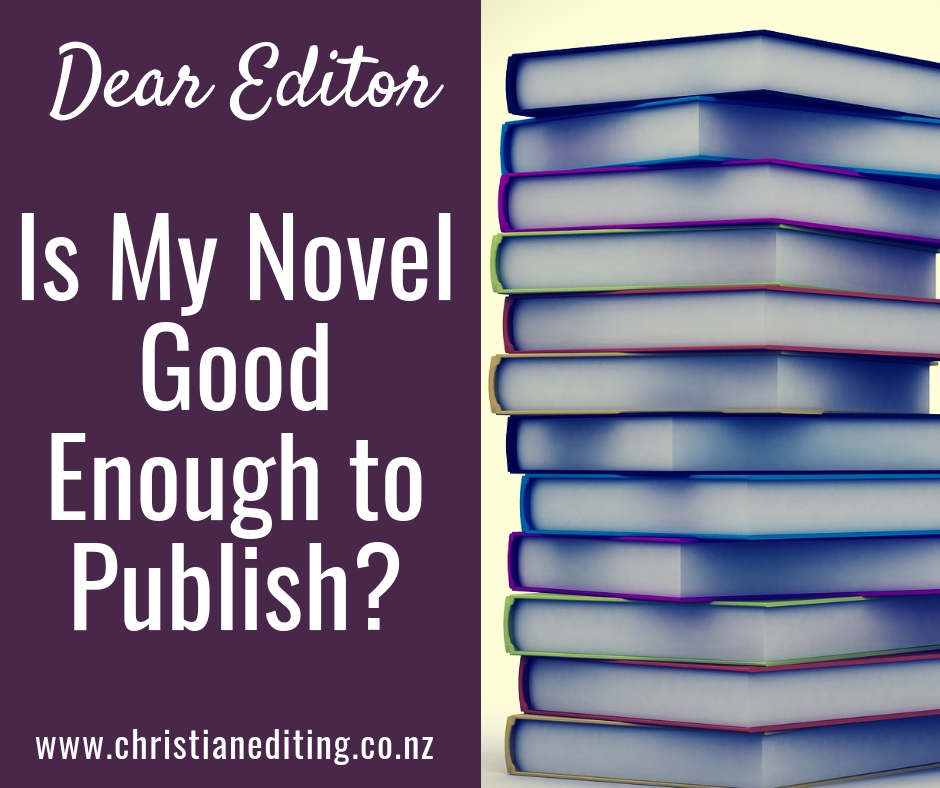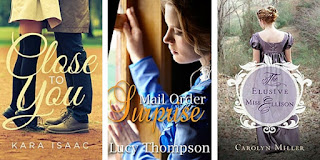I recently completed a manuscript assessment for a new client. After I’d given her my feedback (a lot of feedback), she emailed back with a number of questions. One stood out:
Is My Manuscript Good Enough to Publish?
Easy answer: yes.
The advent of ebooks and print on demand (POD) technology means everything is publishable. But, to misquote 1 Corinthians, you might have the ability to self-publish, but that doesn’t make it a good idea.
It’s especially not a good idea to self-publish through some “service” aka a vanity press—apart from the quality issues, it’s not good Christian stewardship to spend thousands on something you could organise yourself for a fraction of the cost.
So is My Manuscript Good Enough to Publish?
Hard answer: not yet.
Why not?
Anyone can publish anything at any time. But just because we can doesn’t mean we should. And when people say “publish”, they usually mean published by a reputable publisher. Is your novel good enough for your dream publisher?
It depends.
It depends on who you want to publish your novel: a major US publisher, a smaller US publisher, or a local (e.g. Australian) publisher. Attracting your dream publisher will depend on your book scoring well in these areas:
- Representation
- Setting
- Writing Craft
Representation
You’ll need to be represented by a literary agent to have a shot at any of the big-name US CBA publishers like Bethany House or Thomas Nelson. You don’t want just any agent—you want an agent with a track record of selling to the major CBA publishers. (Check out my post on how to find a Christian literary agent.)
In order to get signed by an agent, you’ll need to have credibility as a writer. One way to build credibility is to enter and final in major writing contests.
And you’ll probably need to attend a major US Christian writers’ conference such as the American Christian Fiction Writers conference, as major conferences give you the opportunity to meet agents and publishers in person.
Setting
Your novel will need have to have sales potential. Big sales potential.
Major US Publishers
Major US CBA publishers prefer books set in the US, because that’s what they sell best. They will sometimes diversify and read a historical novel set in England or Scotland, but for the most part, they prefer their fiction to be set in the good old U S of A. Or, at the very least, with an American lead character. For example:
- Close to You, Kara Isaac’s debut novel, capitalised on the US love for all things Lord of the Rings by having an American hero and a Kiwi Lord of the Rings tour guide heroine.
- Mail Order Bride, Lucy Thompson’s debut historical romance, is set in Colorado and utilises the much-loved mail-order bride trope. There may even have been a cowboy.
- The Elusive Miss Ellison, Carolyn Miller’s upcoming debut, is a Regency romance set in England.
Australia
Australian publishers love books by Australian authors with Australian characters and settings. They tend to accept submissions direct from authors (so no literary agent required), and it’s easier to get to meet them in person (the best opportunity for Christian writers is at the Omega Writers’ Conference in October). Personal connections help.
The downside is the Australian market is smaller, which means fewer potential buyers (a fact many Australian authors have lamented on). It also means our small publishers can’t publish every manuscript they see, much as they might like to.
Smaller US Publishers
There are a myriad of smaller Christian publishers, mostly in the US, who may be open to submissions.
If you want a free list of over 100 publishers who publish Christian fiction, click here to sign up to my mailing list. This list does not constitute an endorsement, and I don’t recommend any specific publishers … although there are a few I recommend people steer clear of (like the publisher which offered me a publishing contract without actually seeing my manuscript. Or the publisher sued for deceptive practices. Or the publisher convicted of extortion).
Writing Craft
There is also the aspect of writing craft: is your manuscript good enough?
The bigger the publisher, the better your manuscript has to be. There are so many authors fighting for an ever-decreasing number of publishing slots that anything less than excellent isn’t good enough to get the attention of a major publisher. Publishers get so many excellent submissions that they don’t have time for could-be-excellent submissions or almost-excellent submissions or submissions they can’t see a market for.
Genre
The most saleable manuscripts are those which fit clearly into a popular genre. With novels aimed at the Christian market, this includes meeting the expectations of CBA readers, and being careful regarding ‘edgy’ content—topics so expansive I could write a book about them.
The closer your manuscript aligns with a popular and established genre, the easier it’s going to be to sell to a publisher. But what if you don’t fit a popular genre (e.g. Christian Science Fiction, or New Adult)?
This is when you might consider self-publishing.
But if you pursue self-publishing, pursue excellence as well. Don’t self-publish as a shortcut, to fulfil your publishing dream. Instead, write something good enough to win a major contest or be published by your dream publisher, and choose to self-publish because that’s what you believe God has set out as your path.
Because there are several paths to publishing, and—surprise!—I’ve written some blog posts about them:
- Trade Publishing
- Small Press Publishing
- Self Publishing
- Vanity Publishing (and Why I’m Against Vanity Publishing)
To go back to the original question.
Is my novel good enough to be published? That depends on how you want to publish it. Is your novel good enough for your dream publisher? Share on XYour challenge is to work out how you want it to be published, and do the work necessary to achieve that. Start by checking out 9 Keys to Writing Your First Novel. And pursue excellence.


